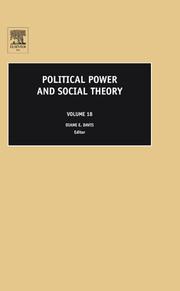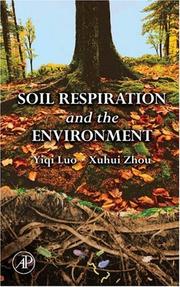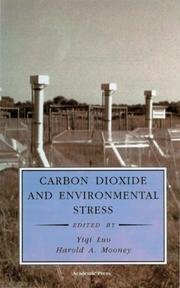| Listing 1 - 6 of 6 |
Sort by
|
Book
ISBN: 0429155654 0367762420 1498737013 1498737021 Year: 2022 Publisher: Boca Raton : CRC Press,
Abstract | Keywords | Export | Availability | Bookmark
 Loading...
Loading...Choose an application
- Reference Manager
- EndNote
- RefWorks (Direct export to RefWorks)
"Carbon moves through the atmosphere, through the oceans, onto land, and into and between various ecosystems. This cycling has a large effect on climate - changing geographic patterns of rainfall and the frequency of extreme weather. The impact of changes in global carbon cycling are altered as the use of fossil fuels add carbon to the cycle. This book addresses the crucial question of how to assess, evaluate, and estimate the potential impact of the additional carbon to the global carbon cycle. The contributors describe a set of models for exploring ecological questions regarding changes in carbon cycling; provide background for developing new models; employs data assimilation techniques for model improvement; and do real- or near-time ecological forecasting for decision support. This book strives to balance theoretical considerations, technical details, and applications of ecosystem modeling for research, assessment, and crucial decision making"-- Provided by publisher.
Carbon cycle (Biogeochemistry) --- Global carbon cycle --- Biogeochemical cycles

ISBN: 9781849504379 1849504377 0762313404 1280636300 9786610636303 0080463940 9780080463940 9780120887828 0120887827 0120887827 0080463975 9786610635764 1280635762 Year: 2006 Publisher: Amsterdam ; Boston : Elsevier Academic Press,
Abstract | Keywords | Export | Availability | Bookmark
 Loading...
Loading...Choose an application
- Reference Manager
- EndNote
- RefWorks (Direct export to RefWorks)
The global environment is constantly changing and our planet is getting warmer at an unprecedented rate. The study of the carbon cycle, and soil respiration, is a very active area of research internationally because of its relationship to climate change. It is crucial for our understanding of ecosystem functions from plot levels to global scales. Although a great deal of literature on soil respiration has been accumulated in the past several years, the material has not yet been synthesized into one place until now. This book synthesizes the already published research findings and presents the
Political science. --- Political sociology. --- Power (Social sciences) --- Historical materialism. --- Dialectical materialism --- History --- Marxian historiography --- Empowerment (Social sciences) --- Political power --- Exchange theory (Sociology) --- Political science --- Social sciences --- Sociology --- Consensus (Social sciences) --- Mass political behavior --- Political behavior --- Administration --- Civil government --- Commonwealth, The --- Government --- Political theory --- Political thought --- Politics --- Science, Political --- State, The --- Philosophy --- Sociological aspects --- Soil --- soil air --- Gas exchange --- Soil biology --- Soil pore system --- Environmental impact --- Climatic change --- Atmospheric carbon dioxide --- Soil aeration --- Soil air --- Soil oxidation --- Soil management --- Environmental aspects. --- Soils --- Soil science --- Agronomy --- Oxidation --- Soil atmosphere --- Soil gases --- Soil chemistry --- Soil physics --- Aeration of soil --- Soil ventilation --- Management --- Air content --- Aeration --- Social theory. --- Political science & theory. --- Political Science --- Philosophy. --- General. --- Social philosophy --- Social theory

ISBN: 9780080463940 0080463940 9780120887828 0120887827 Year: 2006 Publisher: Boston Elsevier Academic Press
Abstract | Keywords | Export | Availability | Bookmark
 Loading...
Loading...Choose an application
- Reference Manager
- EndNote
- RefWorks (Direct export to RefWorks)
The global environment is constantly changing and the planet has warmed at an unprecedented rate. The study of the carbon cycle, and soil respiration, is a very active area of research internationally because of its relationship to climate change. It is crucial for our understanding of ecosystem functions from plot levels to global scales. This book synthesizes research findings and presents the fundamentals of this subject. Including information on global carbon cycling, climate changes, ecosystem productivity, crop production, and soil fertility, this book is geared toward scientists, researchers, and students across many disciplines.
Book
ISBN: 9781032711126 1032711124 1040026311 104002629X 1032698497 Year: 2024 Publisher: Milton : Taylor & Francis Group,
Abstract | Keywords | Export | Availability | Bookmark
 Loading...
Loading...Choose an application
- Reference Manager
- EndNote
- RefWorks (Direct export to RefWorks)
This new edition includes 7 new chapters on machine learning and its applications to carbon cycle research, on principles underlying carbon dioxide removal from the atmosphere, a contemporary active research and management issue, and on community infrastructure for ecological forecasting.

ISBN: 012460370X 9780080500713 0080500714 9780124603707 1281119202 9781281119209 9786611119201 Year: 1999 Publisher: San Diego, CA : Academic Press,
Abstract | Keywords | Export | Availability | Bookmark
 Loading...
Loading...Choose an application
- Reference Manager
- EndNote
- RefWorks (Direct export to RefWorks)
This book focuses on the interactive effects of environmental stresses with plant and ecosystem functions, especially with respect to changes in the abundance of carbon dioxide. The interaction of stresses with elevated carbon dioxide are presented from the cellular through whole plant ecosystem level. The book carefully considers not only the responses of the above-ground portion of the plant, but also emphasizes the critical role of below-ground (rhizosphere) components (e.g., roots, microbes, soil) in determining the nature and magnitude of these interactions.* Will rising CO2 alter
Meteorology. Climatology --- Plant physiology. Plant biophysics --- Air pollution. Air purification --- Plants --- Atmospheric carbon dioxide --- Trees --- Dendrology --- Nursery stock --- Woody plants --- Arboriculture --- Forests and forestry --- Timber --- Plants, Effect of atmospheric carbon dioxide on --- Plant-atmosphere relationships --- Effect of atmospheric carbon dioxide on. --- Environmental aspects. --- Physiological effect --- Effect of carbon dioxide on --- Agrotechnology and Food Sciences. Toxicology --- Environmental Toxicology, Ecotoxicology.

ISBN: 012460370X 9780080500713 0080500714 9780124603707 1281119202 9781281119209 Year: 1999 Publisher: San Diego, Calif. Academic Press
Abstract | Keywords | Export | Availability | Bookmark
 Loading...
Loading...Choose an application
- Reference Manager
- EndNote
- RefWorks (Direct export to RefWorks)
This book focuses on the interactive effects of environmental stresses with plant and ecosystem functions, especially with respect to changes in the abundance of carbon dioxide. The interaction of stresses with elevated carbon dioxide are presented from the cellular through whole plant ecosystem level. The book carefully considers not only the responses of the above-ground portion of the plant, but also emphasizes the critical role of below-ground (rhizosphere) components (e.g., roots, microbes, soil) in determining the nature and magnitude of these interactions.
| Listing 1 - 6 of 6 |
Sort by
|

 Search
Search Feedback
Feedback About UniCat
About UniCat  Help
Help News
News